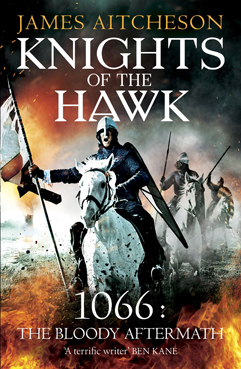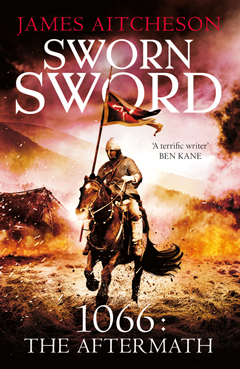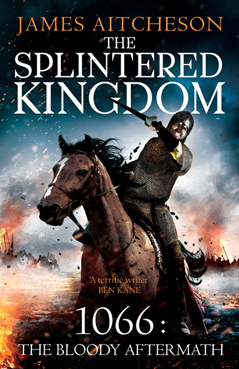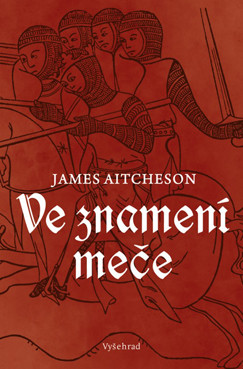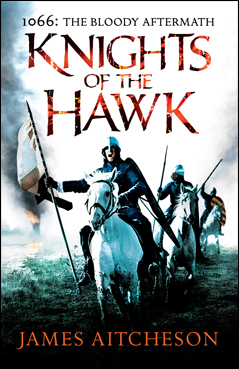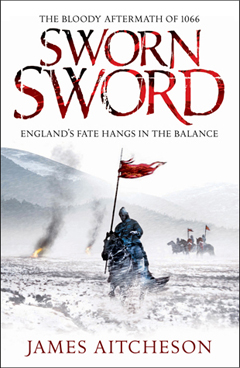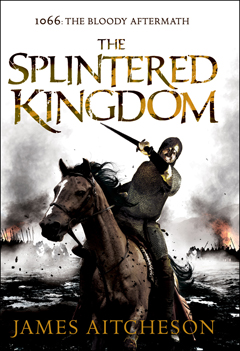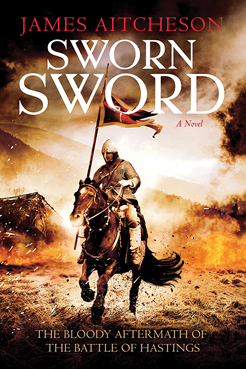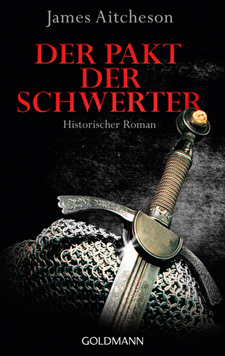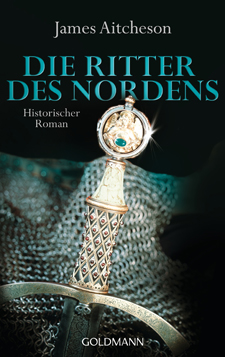Reading guides
Discussion questions for book groups
Warning: contains spoilers.
The guides on this page are intended for book groups and any readers interested in delving deeper into the themes in my novels. If you’re a first-time reader and want to avoid spoilers, look away!
Reading guide – Sworn Sword
Reading guide – The Splintered Kingdom
Reading guide – Knights of the Hawk
Reading guide – The Harrowing
Sworn Sword
- Sworn Sword views the events of the Norman Conquest from the unconventional point of view of one of the invaders: an ambitious knight named Tancred.
- Why do you think Aitcheson made this choice? How might the same events look from an English point of view?
- How easy is it to engage and sympathise with Tancred? What makes him a likeable protagonist?
- How has this different perspective changed your understanding of the Norman Conquest?
- Why do you think Aitcheson made this choice? How might the same events look from an English point of view?
- The action begins in January 1069, over two years after the Battle of Hastings. What are the advantages of setting the novel in the aftermath of 1066, rather than in the lead-up to it?
- Throughout the novel, place-names are given as recorded in contemporary sources (e.g. Dunholm, Lundene), while English personal names are rendered in their original rather than modernised forms (e.g. Eadgyth, Eadgar). What effect does this create?
- How significant is it that Tancred is of Breton rather than Norman origin? Does this affect how other characters regard him?
- Were you surprised by Ælfwold’s treachery towards the end of the novel? Do you feel sorry for him?
- A significant role is played in the story by Guillaume Malet, an aristocrat of mixed Anglo-Norman parentage. How does Tancred’s attitude to him develop over the course of the novel?
- As shown in the novel, knights in the eleventh century were a long way from being the paragons of chivalry with which we are familiar from later medieval sources. Do Tancred and his comrades nevertheless hold to a moral code? To what extent do they subscribe to the chivalric virtues of honour, loyalty, valour and courtesy?
- Both Tancred and Ælfwold find that doing the right thing sometimes involves betraying the trust of others. Are they justified in their actions?
- Sworn Sword ends with a historical note, clarifying what is fact and what is fiction. How does this add to your appreciation of the events that inspired the novel? Does it make you want to find out more about the Norman Conquest?
The Splintered Kingdom
- From the very beginning, Tancred comes across as a more ruthless character than when we last saw him in Sworn Sword.
- Were you surprised by his decision to kill the Welsh prisoners in Chapter One? If so, why?
- In what ways have the burdens of lordship shaped him? Is this new ruthlessness tempered by other, more positive changes in his character?
- Previously a potential love interest, how does Beatrice’s role change in The Splintered Kingdom? How would you assess her feelings towards Tancred, and his feelings towards her?
- Most of the novel takes place in the treacherous borderlands known as the Welsh March. Why do you think Aitcheson chose this region, on the very fringes of England, as the principal setting for the second instalment in the trilogy?
- Tancred gains English friends and allies in this novel, and begins to learn the native tongue. To what extent does this lead to a greater appreciation of the effects of the Norman Conquest on England and its inhabitants as a result?
- The question of what drives someone like Tancred to devote his life to the sword-path runs throughout the book. What, in your view, is his main reason for choosing the warrior’s way of life?
- In what ways does the depiction of warfare and violence in The Splintered Kingdom differ from that in Sworn Sword?
- Several characters act as mentors and confidantes to Tancred, offering him the benefit of their wisdom. How readily does he accept their advice? Who, if anyone, has the greatest influence on him?
- Tancred’s risk-taking leads to disaster on his campaign in Wales, but leads to success in his raid on Beverley (Beferlic). Do you think he is capable of learning from his mistakes, or will his hot-headedness eventually end in tragedy?
- The novel concludes just as an infamous episode of the Conquest known as the Harrying of the North, during which William I laid waste Yorkshire, is getting underway. Why do you think the narrative stops at this point, without exploring this episode further?
Knights of the Hawk
- ‘A man always remembers his first kill.’ Knights of the Hawk is the only novel in the series so far to include a prologue. How does it help set the tone and provide context for the rest of the novel?
- Lordship, oaths and obligations are key themes; Tancred aspires to be the kind of lord that Robert de Commines was to him. Does he succeed? To what extent do you see Tancred’s younger self reflected in his protégé, Godric?
- From the very beginning, the tone of the narrative is more sombre than in previous instalments. How does this reflect Tancred’s development as a character and his experiences over the course of the series so far?
- Fenland and sea form the backdrop for the majority of the novel. How are these wild and untamed settings used to create atmosphere? How do they reflect Tancred’s mood?
- In the second half, Tancred’s personal quest for vengeance takes him out of recorded history and into the mistier realms of fiction. Is it important that historical novels engage with real-life events and characters? What do you think are the potential risks and rewards of venturing ‘off-piste’?
- In Knights of the Hawk, we catch glimpses of Tancred at a later point in his life, when he is an old man setting down the tales of his exploits in writing. What effect does this layering of the narrative generate?
- Tancred’s maverick nature and his desire to be master of his own destiny are the driving forces behind his journey in this novel, but they also have negative repercussions.
- To what extent is he his own worst enemy, sabotaging himself in his struggle for honour and respect?
- Is his headstrong attitude something to be admired, or pitied, or both?
- Are all his troubles of his own making, or can some of the blame be laid at the doors of others?
- Knights of the Hawk concludes in bittersweet fashion. Why do you think Aitcheson chose to add the final twist following the battle at Jarnborg, rather than allow Tancred a more traditional happy ending?
- In the end, Tancred is able to achieve his aim of self-determination. Has it been worth the cost, in your view? What has he had to sacrifice along the way?
The Harrowing
- The main part of the novel is written in the present tense, rather than the more conventional past tense. Why do you think this is, and what effect(s) does it create?
- For all their villainy, the Normans are rarely glimpsed, apart from during a handful of fleeting encounters. How does this affect the reader’s perception of them?
- Whereas most novels are divided into numbered chapters, The Harrowing is split into eight larger sections of uneven length (‘First Day’, ‘Second Day’ etc.). How does this affect the mood of the story as it unfolds?
- Of the five main characters, which one do you most closely identify or sympathise with, and why?
- Resistance and collaboration are key themes of the novel. Which path, if either, do you think is presented as morally right? Which would you choose?
- Tova, the protagonist, is the only character whose tale isn’t narrated in the first person. Why do you think this is, and does it matter?
- Each of the five main characters is guilty of some past wrongdoing. Can you forgive them for the things they’ve done, or are some crimes simply unforgivable?
- Women play a more prominent role in The Harrowing than in Aitcheson’s previous works. To what extent are Tova and Merewyn defined by their gender in the novel?
- What is symbolised by the book Guthred carries, and what is suggested by its destruction towards the end of the novel?
- Although set in the past, The Harrowing also owes much to post-apocalyptic, crime, horror and anti-war fiction. How would you characterise it?
- By focussing on refugees in a time of humanitarian crisis, the novel touches upon contemporary issues. Can we ever learn from history? Is it important that historical novels engage with modern concerns?
- The novel concludes with Tova narrating a story of her own to the refugee children. What do you think is the meaning of this unusual final scene? In what sense does it offer closure?

